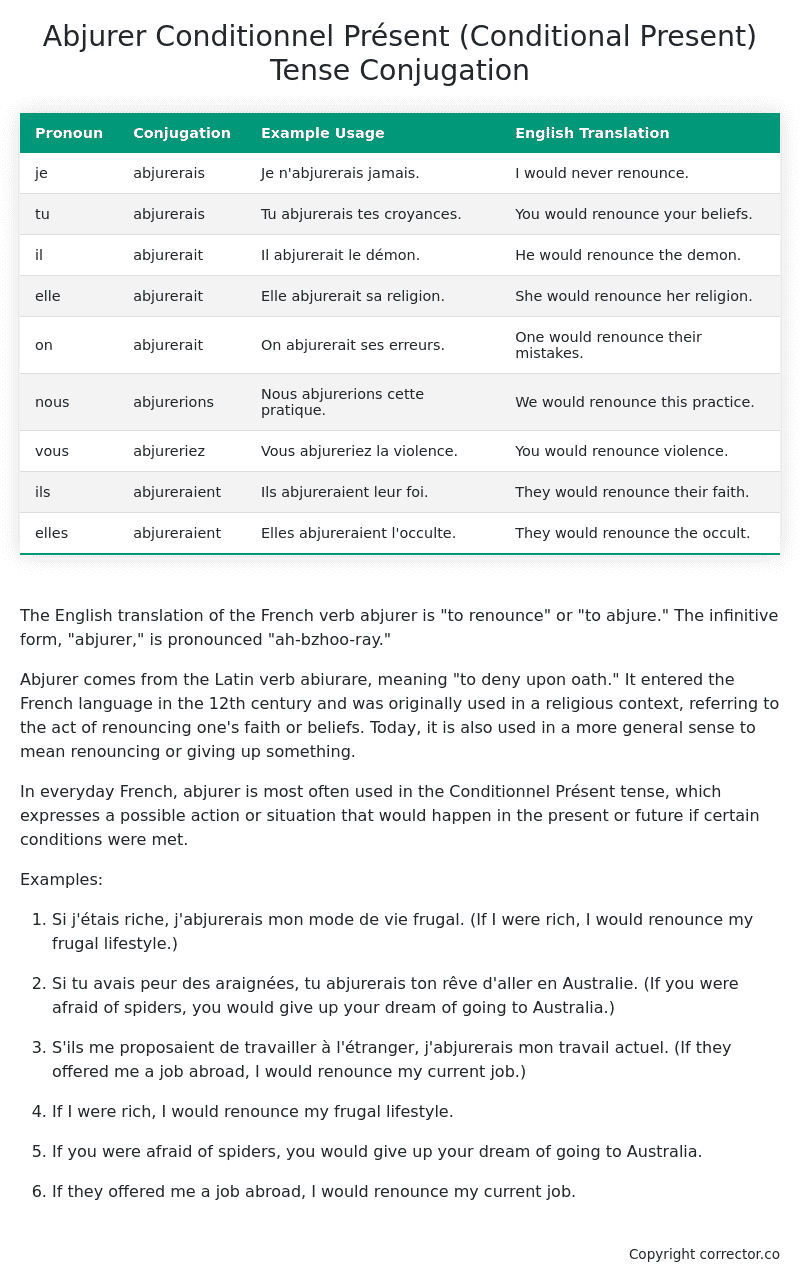Conditionnel Présent (Conditional Present) Tense Conjugation of the French Verb abjurer
Introduction to the verb abjurer
The English translation of the French verb abjurer is “to renounce” or “to abjure.” The infinitive form, “abjurer,” is pronounced “ah-bzhoo-ray.”
Abjurer comes from the Latin verb abiurare, meaning “to deny upon oath.” It entered the French language in the 12th century and was originally used in a religious context, referring to the act of renouncing one’s faith or beliefs. Today, it is also used in a more general sense to mean renouncing or giving up something.
In everyday French, abjurer is most often used in the Conditionnel Présent tense, which expresses a possible action or situation that would happen in the present or future if certain conditions were met.
Examples:
-
Si j’étais riche, j’abjurerais mon mode de vie frugal. (If I were rich, I would renounce my frugal lifestyle.)
-
Si tu avais peur des araignées, tu abjurerais ton rêve d’aller en Australie. (If you were afraid of spiders, you would give up your dream of going to Australia.)
-
S’ils me proposaient de travailler à l’étranger, j’abjurerais mon travail actuel. (If they offered me a job abroad, I would renounce my current job.)
-
If I were rich, I would renounce my frugal lifestyle.
-
If you were afraid of spiders, you would give up your dream of going to Australia.
-
If they offered me a job abroad, I would renounce my current job.
Table of the Conditionnel Présent (Conditional Present) Tense Conjugation of abjurer
| Pronoun | Conjugation | Example Usage | English Translation |
|---|---|---|---|
| je | abjurerais | Je n’abjurerais jamais. | I would never renounce. |
| tu | abjurerais | Tu abjurerais tes croyances. | You would renounce your beliefs. |
| il | abjurerait | Il abjurerait le démon. | He would renounce the demon. |
| elle | abjurerait | Elle abjurerait sa religion. | She would renounce her religion. |
| on | abjurerait | On abjurerait ses erreurs. | One would renounce their mistakes. |
| nous | abjurerions | Nous abjurerions cette pratique. | We would renounce this practice. |
| vous | abjureriez | Vous abjureriez la violence. | You would renounce violence. |
| ils | abjureraient | Ils abjureraient leur foi. | They would renounce their faith. |
| elles | abjureraient | Elles abjureraient l’occulte. | They would renounce the occult. |
Other Conjugations for Abjurer.
Le Present (Present Tense) Conjugation of the French Verb abjurer
Imparfait (Imperfect) Tense Conjugation of the French Verb abjurer
Passé Simple (Simple Past) Tense Conjugation of the French Verb abjurer
Passé Composé (Present Perfect) Tense Conjugation of the French Verb abjurer
Futur Simple (Simple Future) Tense Conjugation of the French Verb abjurer
Futur Proche (Near Future) Tense Conjugation of the French Verb abjurer
Plus-que-parfait (Pluperfect) Tense Conjugation of the French Verb abjurer
Passé Antérieur (Past Anterior) Tense Conjugation of the French Verb abjurer
Futur Antérieur (Future Anterior) Tense Conjugation of the French Verb abjurer
Subjonctif Présent (Subjunctive Present) Tense Conjugation of the French Verb abjurer
Subjonctif Passé (Subjunctive Past) Tense Conjugation of the French Verb abjurer
Subjonctif Imparfait (Subjunctive Imperfect) Tense Conjugation of the French Verb abjurer
Subjonctif Plus-que-parfait (Subjunctive Pluperfect) Tense Conjugation of the French Verb abjurer
Conditionnel Présent (Conditional Present) Tense Conjugation of the French Verb abjurer (this article)
Conditionnel Passé (Conditional Past) Tense Conjugation of the French Verb abjurer
L’impératif Présent (Imperative Present) Tense Conjugation of the French Verb abjurer
L’infinitif Présent (Infinitive Present) Tense Conjugation of the French Verb abjurer
Struggling with French verbs or the language in general? Why not use our free French Grammar Checker – no registration required!
Get a FREE Download Study Sheet of this Conjugation 🔥
Simply right click the image below, click “save image” and get your free reference for the abjurer Conditionnel Présent tense conjugation!

Abjurer – About the French Conditionnel Présent (Conditional Present) Tense
Formation
Common Everyday Usage Patterns
Expressing Polite Requests
Expressing Hypothetical Situations
Expressing Doubt or Uncertainty
Interactions with Other Tenses
Present Tense
Past Tense
Future Tense
Conditional Perfect
Summary
Want More?
I hope you enjoyed this article on the verb abjurer. Still in a learning mood? Check out another TOTALLY random French verb conjugation!


